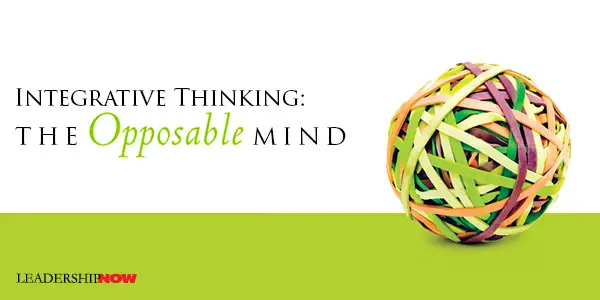 |
 |
11.28.07

Integrative Thinking: The Opposable Mind NOT ONE to put the cart before the horse, Roger Martin understands the importance of doing but he prefers “to swim upstream to the antecedent of doing: thinking.” He writes in The Opposable Mind, “My critical question is not what various leaders did, but how their cognitive processes produced their actions.”
NOT ONE to put the cart before the horse, Roger Martin understands the importance of doing but he prefers “to swim upstream to the antecedent of doing: thinking.” He writes in The Opposable Mind, “My critical question is not what various leaders did, but how their cognitive processes produced their actions.”
In examining how exemplary leaders think, he found an approach that was common to many, that he has termed integrative thinking. Integrative thinking is: The ability to face constructively the tension of opposing ideas and, instead of choosing one at the expense of the other, generate a creative resolution of the tension in the form of a new idea that contains elements of the opposing ideas but is superior to each. In other words, integrative thinking examines problems as a whole, taking note of the complexities that exist and embrace the tension between opposing ideas to create new alternatives that take advantage of many possible solutions.
It’s easy to get into the destructive rut of thinking that money is the solution to most problems. School boards are notorious for claiming that their hands are tied because they lack the money they want. They cripple themselves. What they really need are creative solutions. Education is a complex issue and has for too long been subject to tunnel-vision problem-solving. They need integrative thinking. Einstein opined that we should make everything as simple as possible, but no simpler. Too often we try to make complex issues too simple and leave ourselves with too few options based on our limited point-of-view. If we instead embrace complexity and learn to deal with it, we might find more and better solutions. Martin writes, “More salient features make for a messier problem. But integrative thinkers don’t mind the mess. In fact, they welcome it because the mess assures them that they haven’t edited out features necessary to the contemplation of the problem as a whole. They welcome complexity because they know the best answers arise from complexity.” In The Opposable Mind, Martin clearly illustrates this thinking process in action by dissecting varied examples from both business and interpersonal situations. Martin claims that we are all born with an opposable mind—the ability to hold two conflicting ideas or models in constructive tension. “We can use that tension to think our way through to a new and superior idea….Opposing models, in fact, are the richest source of new insight into a problem. We learn nothing from someone who sees the problem exactly as we do.” 
Posted by Michael McKinney at 09:45 AM
|
BUILD YOUR KNOWLEDGE
 

How to Do Your Start-Up Right STRAIGHT TALK FOR START-UPS 
Grow Your Leadership Skills NEW AND UPCOMING LEADERSHIP BOOKS 
Leadership Minute BITE-SIZE CONCEPTS YOU CAN CHEW ON 
Classic Leadership Books BOOKS TO READ BEFORE YOU LEAD |